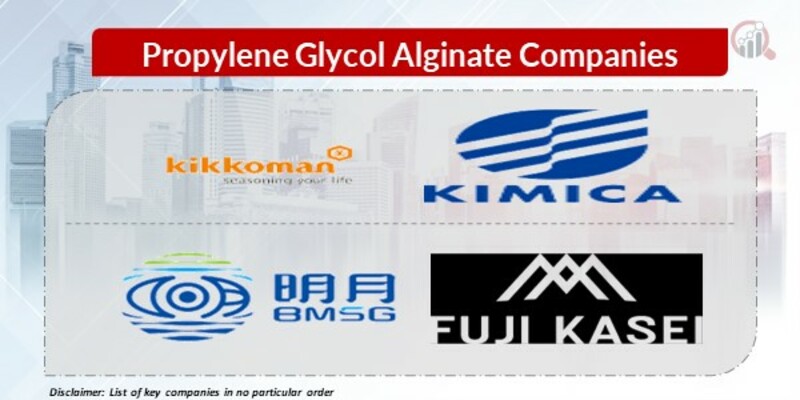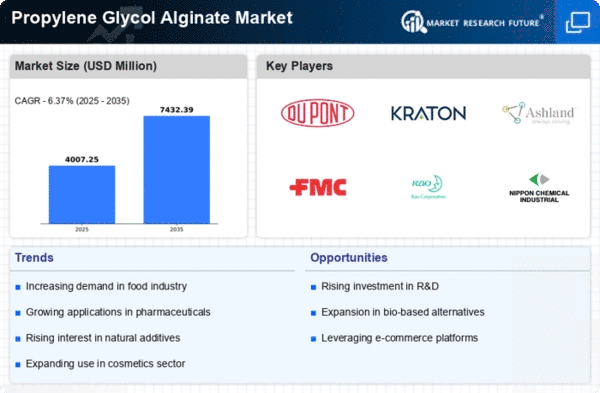Top Industry Leaders in the Propylene Glycol Alginate Market
 The global propylene glycol alginate (PGA) market is a dynamic space teeming with competition and innovation. Diverse players, from established giants to nimble niche players, vie for market share, employing a range of strategies to cater to the ever-evolving needs of end-use industries. This comprehensive analysis delves into the intricate landscape of the PGA market, exploring key players, strategies, market share determinants, industry news, and recent developments.
The global propylene glycol alginate (PGA) market is a dynamic space teeming with competition and innovation. Diverse players, from established giants to nimble niche players, vie for market share, employing a range of strategies to cater to the ever-evolving needs of end-use industries. This comprehensive analysis delves into the intricate landscape of the PGA market, exploring key players, strategies, market share determinants, industry news, and recent developments.
Strategies Shaping the Market:
-
Product Diversification: Leading players like CP Kelco, Cargill, and Kerry are expanding their portfolios to include specialty PGA grades with tailored properties for specific applications in food, pharmaceuticals, and textiles. This allows them to cater to niche segments and command premium pricing. -
Geographical Expansion: Companies are actively entering new markets, particularly in the Asia-Pacific region, driven by rising disposable incomes and a burgeoning demand for processed food and personal care products. Recent examples include Kerry's acquisition of Niacet's PGA business in China and CP Kelco's joint venture with Qingdao Jiaxing Algae Co. Ltd. -
Sustainability Focus: Environmental consciousness is driving players to adopt sustainable practices, such as sourcing PGA from renewable seaweed sources and implementing energy-efficient production processes. This resonates with environmentally conscious consumers and aligns with regulatory trends. -
Vertical Integration: Some players are integrating backward into propylene glycol production to secure raw material supply and control costs. This strategy also gives them greater flexibility to adjust production to market fluctuations. -
Collaboration and Partnerships: Collaboration is on the rise, with players partnering with research institutions and universities to develop novel PGA applications and improve production efficiency. Additionally, strategic alliances are being forged to expand distribution networks and reach new customer segments.
Factors Dictating Market Share:
-
Product Quality and Consistency: Consistent supply of high-quality PGA is crucial for maintaining customer loyalty and market share. Players invest heavily in quality control measures and implement stringent manufacturing processes to ensure product reliability. -
Price Competitiveness: Cost optimization remains a key differentiator, especially for bulk commodity-grade PGA. Players leverage economies of scale and efficient production processes to offer competitive pricing and attract cost-conscious customers. -
Innovation and New Applications: Developing novel applications for PGA in emerging sectors like nutraceuticals and biomedicine opens up new growth avenues and strengthens brand image. Players actively invest in R&D to stay ahead of the curve and differentiate themselves from competitors. -
Regulatory Landscape: Stringent regulations regarding food additives and pharmaceutical excipients necessitate compliance to maintain market access. Players actively engage with regulatory bodies and ensure their PGA products meet all safety and quality standards. -
Regional Trends and Demand: Understanding and catering to the specific needs and preferences of different regional markets is crucial for success. Players tailor their product offerings and marketing strategies to address regional variations in demand patterns and consumer preferences.
Key Companies in the propylene glycol alginate market include
- Universal Preserv-A-Chem Incorporated (U.K)
- Kikkoman Corporation (Japan)
- KIMICA Corporation (Japan)
- Fuji Kasei Co. Ltd (Japan)
- IRO Alginate Industry Co. Ltd (China)
- Qingdao Bright Moon Seaweed Group Co.Ltd (China)
- Rizhao Jiejing Group Co. Ltd (China)
Industry News and Recent Developments:
-
September 2023: Kerry partners with a leading seaweed farm in Indonesia to secure a sustainable source of raw material for its PGA production. -
October 2023: The US FDA approves the use of a novel PGA-based drug delivery system for a controlled-release pain medication. -
November 2023: The European Commission proposes new regulations on the use of food additives, potentially impacting the use of certain PGA grades in the food industry. -
December 2023: A research study published in Nature Materials demonstrates the potential of PGA for developing biodegradable food packaging materials.










